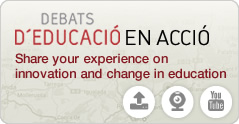- Català
- Español
- English
You are here
Revolutionize schools with design thinking and play. How a New York public school is transforming learning.
About the speaker
Ross Flatt
Learning designer and head of teaching solutions of the Teacher Quest programme of the Institute of Play in New York (USA).
Summary
What are the elements of games that are useful in the learning process?
- The creation of experiences that make the learning process irresistible.
- It is a question of applying those criteria which will make a game interesting and a successful learning experience.
- It is a collective activity in which everyone can participate.
- Learning occurs while playing.
- It is okay to make mistakes.
- You know the results of your actions immediately.
- The opportunities are constant.
What are the benefits of play in the learning process?
- It has been shown that it activates the part of the brain responsible for memory and decision making and helps achieve better academic results.
- It injects energy and changes the learning environment, fostering social relationships.
- It reinforces soft skills: critical thinking, problem solving, empathy, cooperation, creativity and communication.
How is it being put into practice?
- Ross Flatt is one of the founding teachers of the Quest to Learn (Institute of Play), which they created for the design of educational practices based on games. They also offer training for other teachers, both face-to-face and online.
- The Quest to Learn public school in the state of New York is an example of how this methodology can be successfully applied. Normal teaching practices are combined with one-off games and long-term missions which serve to consolidate the learning process and to foster the development of soft skills.
Important considerations when using play in the learning process
- The teachers must believe and be fully involved in the game design process. They must transmit enthusiasm for participation to their students.
- The teachers must work in cooperation with other teachers and need time and space to be able to think, design, and develop the game.
- Empathy should be a basic consideration in the design concept. It is necessary to imagine yourself in the role of the player. It is very important to test the game and to request feedback. If a game is not interesting, it will not motivate the players and the learning objectives will not be achieved.
- The desired learning objective of the game needs to be clearly understood.
Different types of play experience
- The playing of a one-off game which develops one or various skills. Different formats can be used: digital, cards, board game, etc.
- Play as an experience. The setting of a long term challenge, with a fictional story and characters. The students form part of this story. They overcome a series of tests that allow them to continue to the next stage.
- Gamification of the experience.
With the collaboration:
Discover
other ideas
-

How should we build resilient schools to foster al...
Boris Cyrulnik
2016 -

The Problem Solvers: from teaching students to fol...
Charles Leadbeater
2016 -

The Edcamp movement: a peer-to-peer learning init...
Kristen Swanson
2016






 The texts published on this website are, unless otherwise indicated, covered by the Creative Commons Spain Attribution - Non Commercial - No Derivs 3.0 licence. You may copy, distribute and transmit the work, provided you attribute it (authorship, journal name, publisher) in the manner specified by the author(s) or licensor(s). You may not use the material for commercial purposes. You may not transmit any derivative work from this material. The full text of the licence can be consulted here:
The texts published on this website are, unless otherwise indicated, covered by the Creative Commons Spain Attribution - Non Commercial - No Derivs 3.0 licence. You may copy, distribute and transmit the work, provided you attribute it (authorship, journal name, publisher) in the manner specified by the author(s) or licensor(s). You may not use the material for commercial purposes. You may not transmit any derivative work from this material. The full text of the licence can be consulted here: